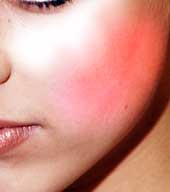 |
 |
 |
Your parents walk into the room just as you are preparing to get cosy with your girlfriend. The guy you have been eyeing for months finally talks to you. Your math teacher screams at you in front of the whole class for your laddoo in the latest test....
These situations have one thing in common — they are all likely to make you turn a charming shade of pink — the exact tone depending on your skin tone, the level of embarrassment and a series of complex physiological responses. In acute cases, most commonly observed amongst teenagers on hormonal overdrive, the sufferer can feel his or her cheeks getting hot and ears beginning to throb and soon, they turn a colour that can only be described as beet red.
Though many women spend hours and much money perfecting the art of achieving a heightened hue by cosmetic means, when the flush has been brought on by nature, it is usually for all the wrong reasons and at the worst possible time.
So what is it, in these bold and brazen times, that still makes all of us blush?
“There’s no standard pattern found in individuals. Some girls may look at Shah Rukh’s six pack and blush, while others won’t,” explains dermatologist Sachin Varma. “Blushing is caused by increased blood circulation in the central area of the face and is controlled by the sympathetic nervous system (or the nerves responsible for sympathetic reactions). It depends upon the way he or she has acclimatised his nervous system,” he says.
Blushing, he adds, is activated by an embarrassing situation, when you are extremely anxious or happy, when you are dreaming about something or when you are in love. You can also go red in the face from eating too much spicy food or drinking red wine. “Excessive intake of wine and cheese releases certain substances that activate the nerves from within the mouth,” says Varma.
For the young, blushing reflex dances cheek to cheek with the first flush of love. “Blushing is associated with love and romance. If you like a guy, a compliment from him will make you instantly blush, and then he’ll know that you like him. It’s an immediate give-away,” says 24-year-old Ankita Dhariwal.
So the occasional blush can act as love-potion for the coy. But, if the blusher’s blush was indeed brought on by embarrassment and not reciprocated emotion, it can lead to painful misconceptions, and, no doubt, more fervent blushing.
Blushing could also be a result of undesired social attention. “I remember the time I was at a restaurant with my cousin and she spilled soda all over. No one in the restaurant could take his or her eyes off us. Boy, did that make me blush,” recalls Snehal Ruparel, working at an HR firm. “I usually blush when I’m mimicking someone and caught unawares. Or at a compliment which I didn’t expect,” says Anamika Ghosh, a media professional.
The pink cheeks could also tell of being caught in a lie. Debaditya Chaudhury, Lakkhichhara’s keyboardist, admits to one such tight spot. “I had given instructions to a staff boy in the office to tell visitors I was away. The boy opened the door and told the visitor, ‘Deba sir bola hai ki woh nahi hai.’ I overheard him and rushed to the door and salvaged the situation by explaining myself but it’s something I blushed about, long after.”
While it may be believed that more “delicate” women blush more than men, some guys blush more than they are comfortable admitting.
“Women are not taken aback by sudden revelations. Guys, on the other hand, react more spontaneously,” feels 27-year-old Adil Murshed Syed, lawyer. Blushing, feels Adil, is ageless too.
And while women are almost expected to blush when their fragile “modesty” is outraged, modesty of a different kind still brings on the pink in plenty, for both men and women. Compliments — the more generous the better — are the frequent causes of an unforseen flush. For example, if you’ve just styled your hair and your pal pounces to take your picture, expect to feel a little warmth creep into your cheeks.
Some people have more colour than they can handle. Some of Sachin Varma’s patients even suffer from what is called rosacea or “excessive blushing”. Here, the central blushing area becomes pink or rose-red more often than you want, and in a shade more vibrant than usual.
For most of us, though, it is little more than an occasional annoyance, the frequency of which lessens considerably when we are around old friends and family, and those with whom we are comfortable.
“When my child asks me embarrassing things like ‘Mom, why does daddy leave the bathroom door open’ at a party, then it’s time to look the other way. But if it’s at home then we all make a joke of it,” laughs homemaker Nandita Tewari, who believes nothing makes her blush as much as her son’s antics.
Those with the chronic blush syndrome have to develop ways to deal with it. “The attention feels good, but do you really want to be that transparent?” asks Anamika, who feels her cheeks give her away a little too often. “Everyone puts two and two together and realises why you’re blushing. Sometimes they get the wrong idea!”
But there is only so far that cover-ups and denials can get you because it is not only your cheeks that betray you but your eyes, your expression, your excessive smiles and fidgeting too. So think of all those potions and powders you can do without and all those skin vitalising treatments you are saving on and embrace your natural glow.
BLUSH-O-METER
You are most likely to blush when you:
Get noticed when you’re checking out a girl/guy
Receive a compliment and don’t know what to say
Put your foot in your mouth
Get spotted getting cosy
Are day-dreaming or fantasising
Receive a sudden slap on the face
Consume too much wine or chilli food
What makes you blush? Tell t2@abpmail.com










